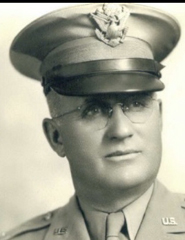Iowans, Prisoners In Germany Tell Experiences
By Frank Miles
(Editor's Note:) (In the case of rescued prisoners, the army permits its field press censors to pass dispatches naming the men before information has been cleared through the routine army channels. This is so a man's family may receive its first inkling of the good news from a newspaper.)
In Germany (IDPA) -- Pfc. Ralph (Shot Gun) Schetgen, ASN 378684090, Dubuque, was guarding the former guards of the Bad Orb prison camp when I arrived after its seizure by third army tanks.
"These fellows are old and weren't too tough" said the short once stocky Hawkeye GI, father of four children, "but what happened to American captives coming here and the conditions under which we had to live until freed, I wish I could forget."
He shook his head sadly but smiled when I reminder him he would soon be home with his family.
Schetgen was one of 3,241 American, 2,021 British, 448 Russian and 448 French soldiers imprisoned at Bad Orb. Yankee armored vehicles had captured German personnel on duty without a struggle. The Americans, 46 Iowans among them, had been taken while fighting in the 28th and 106th divisions during the Von Rundstedt push last December. Many British had been captives for five years.
Sight of Liberators
Sight of the American liberators created indescribable scenes. Gaunt, unkempt men hugged and kissed the corpsmen and one another. Some even kissed the tanks. Some shouted and others screamed, laughed hysterically, cried or stood stunned. Happier men or boys could not be imagined but one said that while he was eager to go home, he wished he might stay and fight until the end of the war. That he hated to leave his closest buddy back at the camp cemetery.
"We were fed a liter of thin soup and a small hunk of bread daily," Schetgen said. "They gave us a foul tasting colored liquid they called coffee in the morning we couldn't drink. Some of the boys used it for washing and shaving their faces. We had no baths and no change of clothes while here."
"About half of the Americans had to sleep on floors in rickety old buildings each with only a rag that might jokingly be called a blanket. Those places were lousy. Lice almost would walk away with the structure in which there were bunks of dirt straw.
Dig in Garbage
"I saw some of our medical officers -- captured Americans -- who with the chaplains worked like slaves for our comfort, actually dig into the garbage piles to get a few morsels of food. They were often so weak they could hardly stand up, but they carried on wonderfully.
"One night a jerry plane came over. Two American planes charged after it. The nazi swooped low and strafed us as he shot away. Two Americans were killed and three were wounded. One of the slain was lying beside me.
"When the SS troops took us they jammed us unto box cars on the floors of which was nearly a foot of horse manure. They locked us in tightly and there was no ventilation. In four days we were given two loaves of bread for each ten men and no water.
"Along with the awful food we almost froze. There was one small stove in each building. We were allowed enough wood to keep a fire going about 30 minutes a day. The fire wouldn't even take a chill off in a room. There were no lights at night. No form of recreation was permitted."
White Crosses
Leaning against the barracks where I talked with Schetgen were a number of high, white crosses placed over graves of 37 Americans, who had died during incarceration.
"They starved to death or died of ailments caused by hunger," Schetgen said.
Other Americans said they they were allowed to write two letters and cards a month and were supposed to receive mail form home but that not one had. They added that no Red Cross packages reached them and charged contents were stolen by he guards.
"My reason for thing that," said a Californian,"is that occasionally one could buy American cigarettes from a guard. We were suppose to turn in all of our money we had on us when we were captured but some of us didn't. The guards knew that. One cigarette sold for as high as 200 francs ($4) and package of 20 for $40.
Iowa Club
Iowans at Bad Orb formed a club. Pvt. Ken Madden, ASN 37490325, Glenwood, was president and Pvt. George Janssen, ASN 37685120, Iowa Falls, was vice president and secretary. Janssen had a complete name of Iowans and their home towns but he wouldn't part with them. He and others planned to have a booklet prepared from it and other material after they returned home.
Janssen has a nine-month-old daughter he has never seen.
Capt. O.O. Buxton, ASN O-1709553, Webster City, a medic, was moving spirit, in the Iowa group. The enlisted men could not speak too warmly of his service to them
Pfc. Ernest Sommerfelt, ASN 37663658, Waterloo, was in a line drawing cigarettes, candy and other things soldiers like so well, when I met him. He has a four-year-old he is eager to see.
Later I went to an army air field from where the Americans and British of Bad Orb were being flown away, homeward bound. There I met Pvt. Lawrence Keinske, ASN 37670872, New Hampton, and Pfc. Harold C. Kiester, ASN 37191575, Glad Brook. The army had flown out 85 planes that day and 100 the day before.
When the men were taken from the camp they were put through a delousing station. First, they threw away the clothes they had worn for months. Next, they had hot baths. Then their hair was sprayed with vermin killer. Afterward, they donned clean garments.
Source: Mount Pleasant News, May 14, 1945
![]()

